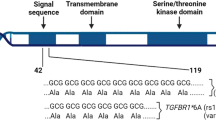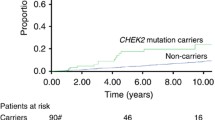Abstract
Introduction
The association between the checkpoint kinase 2*1100delC (CHEK2*1100delC) and breast cancer has been extensively explored.
Objective
In light of the recent publication of studies on these specific findings, particularly regarding male patients with breast cancer, we performed an updated meta-analysis to investigate a more reliable estimate.
Methods
This meta-analysis included 26 published studies selected in a search of electronic databases up to January 2018, including 118,735 breast cancer cases and 195,807 controls. Odds ratios (ORs) with 95% confidence intervals (CIs) were used to assess the association between 1100delC and breast cancer.
Results
Meta-analysis results suggested that 1100delC contributed to an increased breast cancer risk in overall populations (OR 2.89; 95% CI 2.63–3.16). Subgroup analysis found ORs of 3.13 (95% CI 1.94–5.07) for male breast cancer, 2.88 (95% CI 2.63–3.16) for female breast cancer, 2.87 (95% CI 1.85–4.47) for early-onset breast cancer, 2.92 (95% CI 2.65–3.22) for invasive breast cancer, and 3.21 (95% CI 2.41–4.29) for familial breast cancer. The sensitivity analysis suggested that results of this meta-analysis were generally robust.
Conclusion
CHEK2*1100delC is associated with an increased risk of both female and male breast cancer.






Similar content being viewed by others
References
Siegel RL, Miller KD, Jemal A. Cancer Statistics, 2017. CA Cancer J Clin. 2017;67:7–30.
Korde LA, et al. Multidisciplinary meeting on male breast cancer: summary and research recommendations. J Clin Oncol. 2010;28:2114–22.
Hariprasad S, Hariprasad P, Srinivas T. Intracystic papillary carcinoma of the breast in males: a case report and review of the literature. J Clin Diagn Res. 2013;7(3):568–70.
Narod SA, Foulkes WD. BRCA1 and BRCA2: 1994 and beyond. Nat Rev Cancer. 2004;4:665–76.
Meijers-Heijboer H, et al. Low-penetrance susceptibility to breast cancer due to CHEK2(*)1100delC in noncarriers of BRCA1 or BRCA2 mutations. Nat Genet. 2002;31:55–9.
Abud J, Koehler-Santos P, Ashton-Prolla P, Prolla JC. CHEK2*1100delC germline mutation: a frequency study in hereditary breast and colon cancer Brazilian families. Arq Gastroenterol. 2012;49(4):273–8.
Shieh SY, et al. The human homologs of checkpoint kinases Chk1 and Cds1 (Chk2) phosphorylate p53 at multiple DNA damage-inducible sites. Genes Dev. 2000;14:289–300.
Bartek J, Lukas J. Chk1 and Chk2 kinases in checkpoint control and cancer. Cancer Cell. 2003;3:421–9.
Weischer M, et al. CHEK2*1100delC genotyping for clinical assessment of breast cancer risk: meta-analyses of 26,000 patient cases and 27,000 controls. J Clin Oncol. 2008;26:542–8.
Cybulski C, et al. CHEK2-positive breast cancers in young Polish women. Clin Cancer Res. 2006;12:4832–5.
Schutte M, et al. Variants in CHEK2 other than 1100delC do not make a major contribution to breast cancer susceptibility. Am J Hum Genet. 2003;72:1023–8.
Wasielewski M, et al. CHEK2*1100delC is a susceptibility allele for HNPCC-related colorectal cancer. Clin Cancer Res. 2008;14:4989–94.
Apostolou P, Fostira F, Papamentzelopoulou M, Michelli M, Panopoulos C, Fountzilas G, et al. CHEK2 c.1100delC allele is rarely identified in Greek breast cancer cases. Cancer genetics. 2015;208(4):129–34. https://doi.org/10.1016/j.cancergen.2015.02.006.
Yang Y, et al. CHEK2*1100delC variant and breast cancer risk in Caucasians: a meta-analysis based on 25 studies with 29,154 cases and 37,064 controls. Asian Pac J Cancer Prev. 2012;13:3501–5.
Moher D, Liberati A, Tetzlaff J, Altman DG. PRISMA Group. Preferred reporting items for systematic reviews and meta-analyses: the PRISMA statement. Ann Intern Med. 2009;151(264–9):W64.
Wells GA, Shea B, O’Connell D, et al. The Newcastle-Ottawa Scale (NOS) for assessing the quality if nonrandomized studies in meta-analyses. Ottawa Hospital Research Institute. 2009. http://www.ohri.ca/programs/clinical_epidemiology/oxford.asp. Accessed 5 February 2018.
Sharp, S. 1998. sbe23: Meta-analysis regression. Stata Technical Bulletin 42: 16-22. Reprinted in Stata Technical Bulletin Reprints, vol. 7, pp. 148-155. College Station, TX: Stata Press.
Knapp G, Hartung J. Improved tests for a random effects meta-regression with a single covariate. Stat Med. 2003;22(17):2693–710. https://doi.org/10.1002/sim.1482.
Higgins JP, Thompson SG, Deeks JJ, Altman DG. Cochrane handbook for systematic reviews of interventions version 5.1.0. The Cochrane Collaboration 2011.
DerSimonian R, Laird N. Meta-analysis in clinical trials revisited. Contemp Clin Trials. 2015;45:139–45.
Ades AE, Lu G, Higgins JP. The interpretation of random-effects meta-analysis in decision models. Med Decis Making. 2005;25:646–54.
Begg CB, Mazumdar M. Operating characteristics of a rank correlation test for publication bias. Biometrics. 1994;50:1088–101.
Egger M, et al. Bias in meta-analysis detected by a simple, graphical test. BMJ. 1997;315:629–34.
Cybulski C, et al. Risk of breast cancer in women with a CHEK2 mutation with and without a family history of breast cancer. J Clin Oncol. 2011;29:3747–52.
Cybulski C, et al. Estrogen receptor status in CHEK2-positive breast cancers: implications for chemoprevention. Clin Genet. 2009;75:72–8.
Cybulski C, et al. A deletion in CHEK2 of 5395 bp predisposes to breast cancer in Poland. Breast Cancer Res Treat. 2007;102:119–22.
Borun P, et al. Rapid detection method for the four most common CHEK2 mutations based on melting profile analysis. Mol Diagn Ther. 2015;19:419–25.
Bernstein JL, et al. The CHEK2*1100delC allelic variant and risk of breast cancer: screening results from the Breast Cancer Family Registry. Cancer Epidemiol Biomarkers Prev. 2006;15:348–52.
Bak A, et al. A risk of breast cancer in women—carriers of constitutional CHEK2 gene mutations, originating from the North—Central Poland. Hered Cancer Clin Pract. 2014;12:10.
Weischer M, et al. Increased risk of breast cancer associated with CHEK2*1100delC. J Clin Oncol. 2007;25:57–63.
Wasielewski M, et al. CHEK2*1100delC and male breast cancer in the Netherlands. Breast Cancer Res Treat. 2009;116:397–400.
Vahteristo P, et al. A CHEK2 genetic variant contributing to a substantial fraction of familial breast cancer. Am J Hum Genet. 2002;71:432–8.
Syrjakoski K, et al. CHEK2*1100delC is not a risk factor for male breast cancer population. Int J Cancer. 2004;108:475–6.
Sodha N, et al. CHEK2 variants in susceptibility to breast cancer and evidence of retention of the wild type allele in tumours. Br J Cancer. 2002;87:1445–8.
Rashid MU, et al. German populations with infrequent CHEK2*1100delC and minor associations with early-onset and familial breast cancer. Eur J Cancer. 2005;41:2896–903.
Schmidt MK, Hogervorst F, et al. Age- and tumor subtype-specific breast cancer risk estimates for CHEK2*1100delC carriers. J Clin Oncol. 2016;34:2750–60.
Pritzlaff M, et al. Male breast cancer in a multi-gene panel testing cohort: insights and unexpected results. Breast Cancer Res Treat. 2017;161:575–86.
Muranen TA, et al. Genetic modifiers of CHEK2*1100delC-associated breast cancer risk. Genet Med. 2017;19:599–603.
McInerney NM, et al. Evaluation of variants in the CHEK2, BRIP1 and PALB2 genes in an Irish breast cancer cohort. Breast Cancer Res Treat. 2010;121:203–10.
Margolin S, et al. CHEK2*1100delC is prevalent in Swedish early onset familial breast cancer. BMC Cancer. 2007;7:163.
Naslund-Koch C, Nordestgaard BG, Bojesen SE. Increased risk for other cancers in addition to breast cancer for CHEK2*1100delC heterozygotes estimated from the Copenhagen general population study. J Clin Oncol. 2016;34:1208–16.
Kleibl Z, et al. The CHEK2 c.1100delC germline mutation rarely contributes to breast cancer development in the Czech Republic. Breast Cancer Res Treat. 2005;90:165–7.
de Jong MM, et al. No increased susceptibility to breast cancer from combined CHEK2*1100delC genotype and the HLA class III region risk factors. Eur J Cancer. 2005;41:1819–23.
Haytural H, et al. Identification of a novel BRCA2 and CHEK2 A-C-G-C haplotype in Turkish patients affected with breast cancer. Asian Pac J Cancer Prev. 2013;14:3229–35.
Hallamies S, et al. CHEK2 c.1100delC mutation is associated with an increased risk for male breast cancer in Finnish patient population. BMC Cancer. 2017;17:620.
Gorski B. Selected aspects of molecular diagnostics of constitutional alterations in BRCA1 and BRCA2 genes associated with increased risk of breast cancer in the polish population. Hered Cancer Clin Pract. 2006;4:142–52.
Friedrichsen DM, et al. Frequency of CHEK2 mutations in a population based, case-control study of breast cancer in young women. Breast Cancer Res. 2004;6:R629–35.
Einarsdottir K, et al. Linkage disequilibrium mapping of CHEK2: common variation and breast cancer risk. PLoS Med. 2006;3:e168.
Deb S, Lakhani SR, Ottini L, Fox SB. The cancer genetics and pathology of male breast cancer. Histopathology. 2016;68:110–8.
Brinton LA, Richesson DA, Gierach GL, Lacey JV Jr, Park Y, Hollenbeck AR, Schatzkin A. Prospective evaluation of risk factors for male breast cancer. J Natl Cancer Inst. 2008;100:1477–81.
The CHEK2 Breast Cancer Case-Control Consortium. CHEK2*1100delC and susceptibility to breast cancer: a collaborative analysis involving 10,860 breast cancer cases and 9065 controls from 10 studies. Am J Hum Genet. 2004;74(6):1175–82. https://doi.org/10.1086/421251.
Thompson D, Seal S, Schutte M, McGuffog L, Barfoot R, Renwick A, et al. A multicenter study of cancer incidence in CHEK2 1100delC mutation carriers. Cancer Epidemiol Biomarkers Prev. 2006;15(12):2542–5. https://doi.org/10.1158/1055-9965.epi-06-0687.
Adank MA, Verhoef S, Oldenburg RA, Schmidt MK, Hooning MJ, Martens JW, et al. Excess breast cancer risk in first degree relatives of CHEK2 *1100delC positive familial breast cancer cases. Eur J Cancer (Oxford, England: 1990). 2013;49(8):1993–9. https://doi.org/10.1016/j.ejca.2013.01.009.
Pritchard CC, et al. Inherited DNA-repair gene mutations in men with metastatic prostate cancer. N Engl J Med. 2016;375:443–53.
Falchetti M, et al. BRCA1/BRCA2 rearrangements and CHEK2 common mutations are infrequent in Italian male breast cancer cases. Breast Cancer Res Treat. 2008;110:161–7.
Neuhausen S, et al. Role of CHEK2*1100delC in unselected series of non-BRCA1/2 male breast cancers. Int J Cancer. 2004;108:477–8.
Evans DG, et al. BRCA1/2 mutation analysis in male breast cancer families from North West England. Fam Cancer. 2008;7:113–7.
Rajkumar T, et al. BRCA1, BRCA2 and CHEK2 (1100 del C) germline mutations in hereditary breast and ovarian cancer families in South India. Asian Pac J Cancer Prev. 2003;4:203–8.
Bell DW, et al. Genetic and functional analysis of CHEK2 (CHK2) variants in multiethnic cohorts. Int J Cancer. 2007;121:2661–7.
Song CG, Hu Z, Yuan WT, et al. CHEK2 c. 1100delC may not contribute to genetic background of hereditary breast cancer from Shanghai of China. Chin. J Med Genet. 2006;23:443–5.
Offit K, Pierce H, Kirchhoff T, Kolachana P, Rapaport B, Gregersen P, et al. Frequency of CHEK2*1100delC in New York breast cancer cases and controls. BMC Med Genet. 2003;4:1.
Dufault MR, Betz B, Wappenschmidt B, Hofmann W, Bandick K, Golla A, et al. Limited relevance of the CHEK2 gene in hereditary breast cancer. Int J Cancer. 2004;110(3):320–5. https://doi.org/10.1002/ijc.20073.
Ohayon T, Gal I, Baruch RG, Szabo C, Friedman E. CHEK2*1100delC and male breast cancer risk in Israel. Int J Cancer. 2004;108(3):479–80. https://doi.org/10.1002/ijc.11603.
Syrjakoski K, Kuukasjarvi T, Auvinen A, Kallioniemi OP. CHEK2*1100delC is not a risk factor for male breast cancer population. Int J Cancer. 2004;108(3):475–6. https://doi.org/10.1002/ijc.11384.
Choi DH, Cho DY, Lee MH, Park HS, Ahn SH, Son BH, et al. The CHEK2*1100delC mutation is not present in Korean patients with breast cancer cases tested for BRCA1 and BRCA2 mutation. Breast Cancer Res Treat. 2008;112(3):569–73. https://doi.org/10.1007/s10549-007-9878-z.
Author information
Authors and Affiliations
Corresponding author
Ethics declarations
Funding
No sources of funding were used to conduct this study or prepare this manuscript.
Conflict of Interest
ML, YZ, CS, FKR, MM, TS, YS have no conflicts of interest.
Ethical approval
This article does not contain any studies with human participants or animals performed by any of the authors.
Rights and permissions
About this article
Cite this article
Liang, M., Zhang, Y., Sun, C. et al. Association Between CHEK2*1100delC and Breast Cancer: A Systematic Review and Meta-Analysis. Mol Diagn Ther 22, 397–407 (2018). https://doi.org/10.1007/s40291-018-0344-x
Published:
Issue Date:
DOI: https://doi.org/10.1007/s40291-018-0344-x




